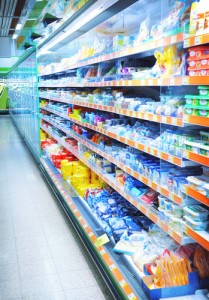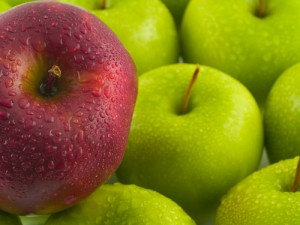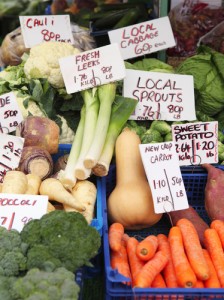Shopping in the grocery store isn’t as straightforward as it seems. Though they’ve come a long way (in some ways), there are still things they’d rather keep under wraps…
Read on.
Dates Don’t Mean Much
 The best-by and sell-by dates don’t mean much as far as food safety is concerned. They’re actually not even required by the FDA. Use-by dates are more like expiration dates, but even then the safety of your food depends on how it’s handled, too, in the store and at home. If a product needs to be refrigerated but it’s at the front of the a doorless refrigerated case, how warm is it really? Probably not the perfect temperature for maintaining its freshness all the way through the use-by date, and that means you have less time to use it up before it officially goes bad.
The best-by and sell-by dates don’t mean much as far as food safety is concerned. They’re actually not even required by the FDA. Use-by dates are more like expiration dates, but even then the safety of your food depends on how it’s handled, too, in the store and at home. If a product needs to be refrigerated but it’s at the front of the a doorless refrigerated case, how warm is it really? Probably not the perfect temperature for maintaining its freshness all the way through the use-by date, and that means you have less time to use it up before it officially goes bad.
Also, there’s a difference between the temperatures at which some items are stored at the grocery store (their optimal conditions) and how they’ll be stored at home. Your refrigerator may not be as cold as the meat or dairy case, for example, so regardless of the sell-by or use-by date, once you take your food home from the grocery store, you may only have two to five days to eat or freeze your food. The USDA has a list that breaks that down for you. For example, if you want to eat meat and you go pick up some chicken from the store, you only have about one or two days to use or freeze it. That’s not to say that your chicken will become completely unsafe overnight, but it will no longer be top quality.
Look at your food. Sniff your food. You can usually decide if something’s gone bad by the way it looks or smells. Use the dates as guidelines if you buy pre-packaged food with them on there, but don’t rely so heavily on them because the food could go bad before then. In some cases, you may even find that your food is perfectly fine past the dates on the packaging would lead you to believe. I don’t recommend consuming foods that are past their use-by dates, however, unless they were frozen within a couple of days of buying them.
There Are Germs and Bacteria Everywhere

However, there are some things you can do to protect yourself and your family. Put all your fresh produce in the bags they have nearby so there’s a barrier between the cart or belt and your food. Always wash your hands after you’re done shopping and scrub your fruits and vegetables before you eat them. Don’t be paranoid of course, but be aware.
They Market Junk to Kids

Produce Misters Could Be Spreading Bacteria and Mold

Misters have been linked to Legionnaires’ disease, which is airborne and comes with flu-like symptoms. It’s not contagious by eating the sprayed food. Sometimes the machines aren’t properly sanitized, and that makes a happy breeding ground for bacteria and viruses.
P. aeruginosa bacteria is no stranger to fresh produce. Though it can come from water in the fields, during harvest, while handling, and so forth, there’s a chance it’s contaminating some of the produce via the misters in the supermarket if they aren’t cleaned properly. P. aeruginosa tends to colonize in areas like faucets and showerheads.
You May Not Be Getting What You’re Paying For
Seafood fraud, or putting the wrong label on a package of seafood for financial gain, is more common than you might think. That means even if you do your homework and find out which fish have the lowest amount of toxins, you still may not be benefiting from your research. It’s not as simple as educating yourself on what certain types of fish look like once they’re skinned and filleted, either. Sometimes the one you’re sold looks so much like the one you think you’re getting, determining which is which would take a DNA test. That’s not an exaggeration!
Short-weighting is another issue, and it doesn’t just happen with fish. Water and other additives are added to a lot of meats (like steak), so the weight on the package may not be the true weight of the meat. You’re paying more than you might in a butcher shop, for example, where you can also very easily ask questions about where the meat came from (always a good idea if you’re going to consume these products!) and avoid some of those additives.

I also have a Shop Yourself Slim guide just for you, so you can navigate the grocery store the Beauty Detox way. It may not fix all the issues with shopping at the supermarket, but it can make the trip a little less daunting and keep you from other traps, like GMO-laden foods and other toxins that hide in seemingly innocuous choices!


Wow! Thank you for this ultra-informative article. I always use the anti-bac wipes for the cards when they offer them. You truly don’t know what these places have in store when it comes to nutrition and bacteria!
I was recently an assistant mgr for a prominent grocery chain. Most green produce (lettuces, celery, etc.) is soaked in a special solution that forces the plants to absorb larger quantities than they would if washed in plain water. The solution keeps the produce fresher for twice as long, also greatly increases the weight – and, therefore, the price you pay.
Also, the stores are not allowed to re-weigh meat more than one day past the original cut date because the water evaporates and the product weighs less – and, therefore, the price you pay. The fresh-cut meat in the case is packaged for the shelf the morning of the 2nd day at a lower price, so your best deal is to look for high-end in-store cuts on the shelf (T-bones, filet mignon, ribeye, etc.).
How about some real T, like that pre-made puddings of most varieties found in most grocery stores contain fine grade glass, to keep the consistency of the pudding. FDA approved no less. Apparently the FDA has determined what is an acceptable level of glass consumption for adults and children. Research that and blog about, it is quite true.
w
What do you use to clean your produce? There are so many sprays and cleaners
Would love a rec!
Is there anything I can soak produce in to help get rid of the pesticides etc?
Yes, you can soak them a big dose of “grow your own”. It’s available in most hardware stores in small, just-add-dirt-and-water packages… they kinda look like candy, but if you put them in the dirt and keep them watered, you get pesticide free “Whatever you planted” in a few weeks.
Try it sometime. ;)
I just wanted to say that… that part where you said to scrub the fruit and vegetables, is cool but… There are still pesticides inside the fruits. Not only on the outside… But I know you already know that. Just wanted to let you know, you forgot to add that Kimberly… I’m your numba #1 fan. thanx a million times.
Hi Kimberly,
I’m curious what your thoughts are on Garcinia Cambogia which was featured on the Today show???
Thank you!
Great great info. You would think the food industry was there to help us get healthy. Commercials are so misleading and so is the packaging, what a shame.
Magnificent beat ! I wish to apprentice while you amend your website, how can
i subscribe for a blog website? The account helped me a acceptable
deal. I had been tiny bit acquainted of this your broadcast provided bright clear concept